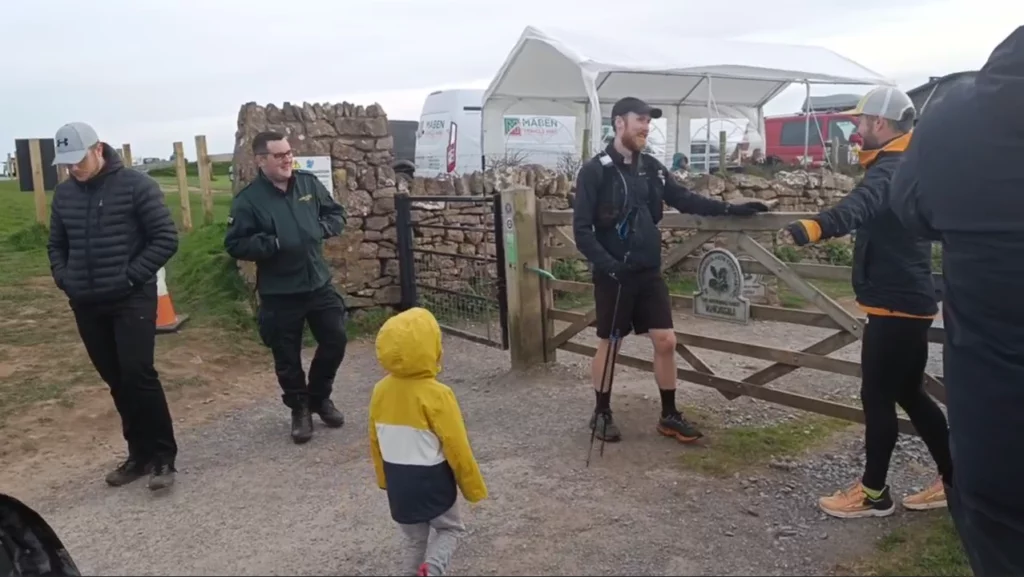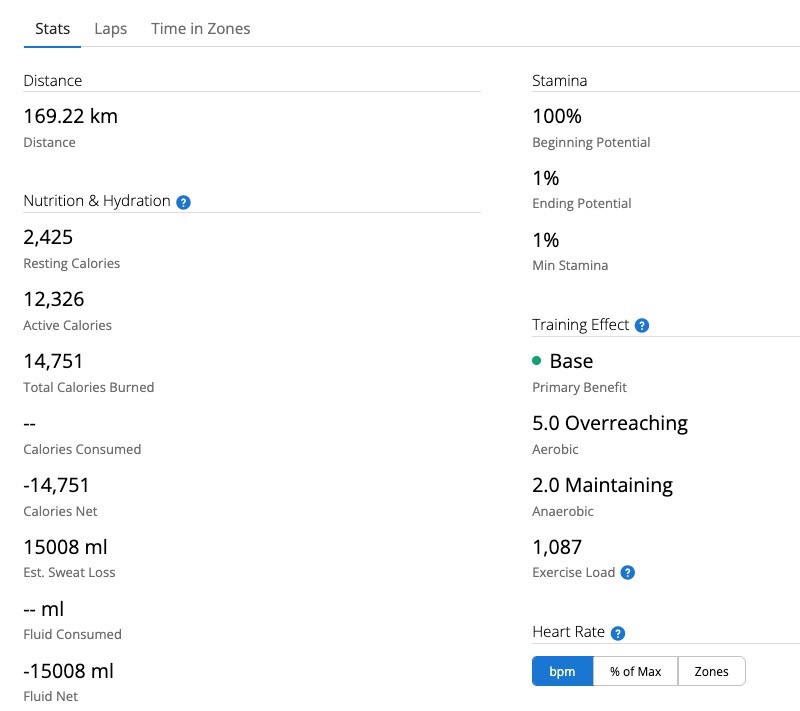Kilometer 317 of 322 km had just ticked over. I was in the final leg of the beastly Wild Horse 200 South Wales race). Having just barely evaded a bad case of hyponotremia (16km earlier), I now found myself in an adrenalin induced ‘sprint finish’. Somehow I was running the fastest splits of the entire 200 mile distance since the race started 3 days earlier. In around 30 minutes time I would be shivering uncontrollably behind the finish line, in a state of shock. This was the first time I experienced this particular symptom, in a growing list of post ultra symptoms I’ve discovered in my years tackling silly distance events.

Post ultra symptoms – physical
Physical symptoms can vary depending on duration, length of event, type of terrain, cardiovascular fitness, and what I call ‘running durability’. Training these various systems helps to reduce the impact, but it is impossible to mitigate everything.
Muscle cramping and twitches
Some races I’ve struggled to sleep after, these have generally been the 50 to 100 mile distance events.
Most common for me is the inability to lie still in one place after a 100 mile event. My hip flexors or glute muscles often cramp up every 15 minutes if I don’t move around, causing me to constantly shift in bed, losing sleep.

Night sweats
The worst of the post ultra symptoms I’ve experienced so far are what I call ‘night sweats’. I got these after running the Wild Horse 200 mile race, and haven’t had them for any less distance or time on feet since. For around 1 week post event, I sweated profusely in my sleep. It was so bad I had to lay down towels underneath me, and keep a fan blowing each night. I would wake up in the middle of the night, completely drenched.
DOMS (Delayed onset muscle soreness)
This is an obvious one for me, and one that comes about if I push really hard in a race, or run much longer than any of my ‘long’ training runs. It can be especially bad in mountain ultras where there are prolonged descents that can absolutely destroy my quads.
Immune system hit
The immune system is often at its weakest after we physically exert ourselves to these levels. We’re most vulnerable in the days following huge efforts.
Earlier this year, at the end of Feburary, I took on the 13 peaks challenge over 48 hours. A day later, arriving back in Knysna, I had a small cough going on. The next day I was floored by a virus I picked up. I was so weak and could hardly do anything for the few days following. I even ended up on a drip that my wife’s sister-in-law hooked up for me.

Post ultra symptoms – nutritional
I can only speak from personal experience, but I think it mirrors what many people experience, which is instant hunger. Especially for the really long events.
We can burn thousands of calories, and usually are not able to keep calorie intake inline or above what the deficit is. By the time we’ve finished a race we’re usually way into the negative.

Not only that, but the body needs recovery in the days following. It’s not unusual to find me in the kitchen snacking at all sorts of random times, even right before bed. After my 200 mile race this ‘hunger’ lasted around two weeks! I was eating around double what I would normally eat every day.
Post ultra symptoms – mental
After a big race, or long time on feet, successfully crossing the finish line, I think its safe to say we all get that feeling of elation.
The void
I personally feel really good for a few days, thinking back on the success and adventure. However, soon enough that feeling of elation can quickly spiral downward.
The best way I can describe this is that it feels like there is some kind of void in my life. I’m pretty sure this is one of the reasons long distance running and ultra marathons can be addictive.
After spending so much time building up to, and then actually doing a race, we come out the other side in a ‘void’. We don’t know what to do now that there is no major focus. And soon enough we find a way to fill that hole – signing up for another adventure or event. The cycle begins again!
In some ways I find this can be a good thing. Always having goals keeps us focused, but it is important to try to maintain balance in other areas around that drive.
Creativity
It’s not all bad. I tend to get bursts of creativity after a big event. It’s a great time to recover and get other things done. Less time running means I can spend more time catching up with family and tackling creative projects I enjoy. Here are some hobbies I often do during these post-race downtime periods:
- Programming (personal projects like my ‘running tools’, or game development)
- Writing (such as blog posts right here) or my other blogs
- Designing, building, and 3D printing
- Art
- Hardware tinkering, e.g. messing around with IoT (Internet of Things) devices, etc…



Emotional
I’ve been overwhelmed suddenly by emotions on a few occassions. The first was my first 50 mile race, right near the end. With all the time spent mostly alone that day, out on my feet, I had thought all the the thoughts there were to think, all the little worries of daily life had faded away. My mind now had time to process some really profound thoughts, and I found myself in tears as I ran down one of the beautiful mountains nestled away in the Bannau Brycheiniog National Park.
It happened again at the end of the 200 miler, and on one or two other 100 mile races I did.


I haven’t had post-event emotional hits like these, though I wouldn’t be surprised if some experience this after the fact. For me they tend to happen during the race, after many hours spent running and toiling away.
Post ultra symptoms in closing
In short, there are so many different post ultra symptoms to deal with. Nevermind the issues we need to tackle on the go! Training can go a long way to mitigating many of these issues, but it really is impossible to prevent everything.
There will always be a point where fatigue, exertion, exhaustion, or whatever else kicks in.
It seems that despite all these challenges and effects to deal with after these big events, we still do them! The positives clearly outweight the negatives.
What is a memorable symptom you’ve experienced and had to deal with after a big day out?


Sean, this really resonated with me! I don’t have nearly as much experience as you, but the little I do have makes me absolutely agree. After Comrades, I made the rookie mistake of lying down at the finish – worst idea ever. The cramps hit instantly and I could hardly get up again.
Your photos after Wild Horse really capture the raw, emotional side of ultras – so real. And the bit about the “void” hit home, too. After Comrades, I was lucky: I went straight into a multi-day hike, which kept me busy and helped dodge that emptiness.
It’s amazing how ultras leave runners broken, inspired, and already plotting the next one. Thanks for putting it into words!
You’ve done more than enough tough races and multi-day adventures to have experienced the physical and emotional after effects!
I can only imagine the physical pain after Comrades. Close to 100km of pounding the tarmac has got to be on another level.
To cope with those empty feelings after races I’ll often line up projects in the back of my mind to keep busy with, but having a multi-day hike or holiday planned in is the perfect way of tapering off afterwards. I was still impressed you managed that time on feet after Comrads though!
After the TdMB the other week, one of the guys went straight into holiday mode in Portugal. Now that’s my kind remedy.
Incredibly well written post, Sean. You are definitely in a different league than me. So amazing about the night sweats. The body’s reaction to being brought through such extremes is really fascinating.
Although my distances haven’t been nearly as extreme, I am hesitant driving home after running even 50k as my legs cramp up when I’m behind the wheel. They didn’t use to, so I don’t know if it is an age thing.
Thanks so much for reading Carl, and it’s great to hear from you.
I’m with you on the leg cramps though. I also get that after shorter races. I think it all comes to the effort we put in relative to how much training we’ve had. Sometimes in a race we’ll push harder than we do in training, or perhaps we don’t practice 50k distances often or even at all in the lead up to a 50k race, which means our bodies (and in particular here, leg muscles) aren’t adapted fully, so they end up cramping right afterwards, and getting that delayed onset muscle soreness feeling the days after.
I’ve dialed back mileage quite a bit in the last few months aside from one race, and haven’t been doing any longer efforts for a couple of months. I went out for a longer than usual run the other day and got back with that feeling – totally broken! It’s amazing too how the body can regress and lose that adaptation, seemingly even easier than it took to build in the first place.
So don’t pin it on all your age. You’re doing wonderful things for your age, and it’s so inspiring. Thanks again for dropping by!